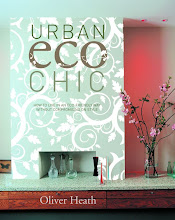
Exterior spaces should be treated with the same care and attention to detail as the interior of your home. They are a chance to get closer with nature which I believe has a calming and grounding effect on our lives.
In my own home I have created two outside spaces by building a structural glass balcony above a lower ground floor patio area. The upper space has a neat fold down picnic table and chairs made from reclaimed timber (which folds away when not in use, so it looks like a timber wall) and is perfect for alfresco breakfasts and growing tomatoes - see the picture for this years crop!

The lower space, which is partly covered over by the glass balcony above, has a number of functions. As the glass allows a maximum of light to filter down, it keeps the basement floor to stay light and airy. Being protected from rain, its good for drying washing (without the need for a dryer) – and it makes a perfect retreat space in the summer, staying cool and quiet. I’ve made the space feel more luxurious by the addition of 2 chaise lounges from reclaimed timber and filled the space with exotic market finds such as vintage mirrors, tables, chandeliers, and bird cages – all of which give it an air of grandeur. Even the floor is sustainable – the decking is made from reclaimed wood and plastic –it’s non slip and won't go green and moldy like timber – so it's very low maintenance. But if you have the space there’s no reason why you can't do more to encourage wildlife and make your own home more sustainable. You may want to consider a home composting system, rainwater harvesting from the water collected by you roof, bird feeding areas, and encourage native plants and grasses to grow.
But if you have the space there’s no reason why you can't do more to encourage wildlife and make your own home more sustainable. You may want to consider a home composting system, rainwater harvesting from the water collected by you roof, bird feeding areas, and encourage native plants and grasses to grow.


